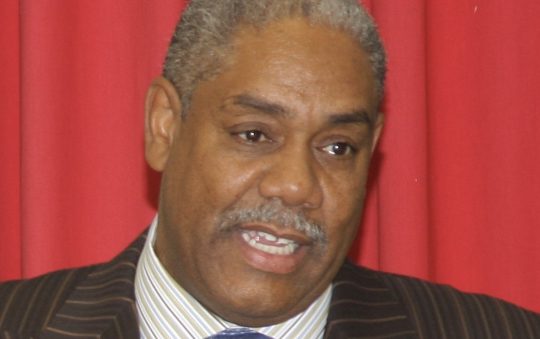
The man who broke golf’s color barrier now has a street named after him in South Los Angeles – aptly, one that leads right into the Chester Washington Golf Course.
Supervisor Mark Ridley-Thomas unveiled the new street sign on Sunday August 16, and the road previously known as West 120th Street between Western and Van Ness avenues is now called “Charlie Sifford Drive,” in honor of the first African American to earn a Professional Golfers Association (PGA) Tour card, in 1961.
“It’s important that we honor Mr. Sifford’s tremendous accomplishments, so that all may be inspired by his courage and perseverance,” Supervisor Ridley-Thomas said at the ceremony, which marked the culmination of the Advocates Pro Golf Tour.
Sifford, who passed away in February at age 92, has often been called the “Jackie Robinson of golf. For him, the hazards on the course included not only sand traps and water holes. With his trademark cigar, Sifford endured racist slurs from the gallery, segregation in clubhouses – even death threats. At a tournament in Arizona, someone left human waste for him to find in the hole at the first green.
“He was a strong-willed, tough individual with a stubborn streak,” Charles Sifford, Jr. said fondly of his father. “He was determined to succeed, and he wasn’t going to let anybody or anything stand on his way.”
By breaking the color barrier, Sifford teed it up for other minority players like Tiger Woods to compete.
“He’s had a tremendous impact on the sport,” said Kenneth Bentley, executive director of the Advocates Pro Tour. “But what I really admire about Charlie is that he went through all that discrimination, and he did it with class and dignity.”

Born in Charlotte, North Carolina, in 1922, Sifford learned to play while trying to make a living as a caddy in the Jim Crow South. After serving in the Army, he honed his swing in the United Golf Association, which allowed golfers of all races to play. Sifford won the UGA’s most important event – the National Negro Open – half a dozen times, including five years in a row during the 1950’s.
By the time the PGA did away with its “Caucasian-only” membership clause in 1961, under legal pressure, Sifford was past his prime. Still, he won PGA Tour events in 1967 and 1969, as well as its Seniors’ Championship in 1975.
In 2004, Sifford became the first African American inducted into the World Golf Hall of Fame, which quoted him saying, “If you try hard enough, anything can happen.”
President Barack Obama awarded Sifford the Presidential Medal of Freedom, the nation’s highest civilian honor, in a ceremony at the White House in 2014. Other recipients that year included Meryl Streep, Stevie Wonder, Tom Brokaw, Isabel Allende and Stephen Sondheim.
On Sifford’s death at the age of 92, the president issued a statement calling him a golf legend who often faced “indignity and injustice even as he faced the competition… altering the course of the sport and the country he loved.”
“(Sifford) proved that he belonged,” the president added, “blazing a trail for future generations of athletes in America.”






